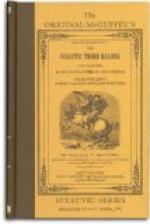Definitions.—4. Im-mense’, very large. In-hab’it-ed, occupied as a home. Cav’al-ry, a body of military troops on horses. 5. Im—pet-u-os’i-ty, fury, violence. 8. Dex’ter-ous-ly, skillfully. 9. Re—duced’, brought into. 10. O-rig’i-nal-ly, at first. 12. Pa-rad’ed, showed off. 8. Sym’me-try, a proper proportion of the several parts. 13. To-man’, a Persian coin valued at about three dollars. 15. Des’per-ate, without care of safety. De-liv’er-ance, release from danger. 16. Gal’lant, brave, heroic.
Exercises.—Where are wild horses found? How are they taken? For what purpose are they taken? In what country are the finest horses raised? Why are the horses so excellent there? Are not animals always made better by kind treatment? Why would not the Arab sell his horse? Relate the anecdote of the planter and the shipwrecked seamen.
XLVIII. EMULATION. (132)
1. Frank’s father was speaking to a friend, one day, on the subject of competition at school. He said that he could answer for it that envy is not always connected with it.
2. He had been excelled by many, but did not recollect ever having felt envious of his successful rivals; “nor did my winning many a prize from my friend Birch,” said he, “ever lessen his friendship for me.”
3. In support of the truth of this, a friend who was present related an anecdote which had fallen under his own notice in a school in his neighborhood.
4. At this school the sons of several wealthy farmers, and others, who were poorer, received instruction. Frank listened with great attention while the gentleman gave the following account of the two rivals:
5. It happened that the son of a rich farmer and the son of a poor widow came in competition for the head of their class. They were so nearly equal that the teacher could scarcely decide between them; some days one, and some days the other, gained the head of the class. It was determined by seeing who should be at the head of the class for the greater number of days in the week.
6. The widow’s son, by the last day’s trial, gained the victory, and kept his place the following week, till the school was dismissed for the holidays.
7. When they met again the widow’s son did not appear, and the farmer’s son, being next to him, might now have been at the head of his class. Instead of seizing the vacant place, however, he went to the widow’s house to inquire what could be the cause of her son’s absence.
8. Poverty was the cause; the poor woman found that she was not able, with her utmost efforts, to continue to pay for the tuition and books of her son, and so he, poor fellow! had been compelled to give up his schooling, and to return to labor for her support.
9. The farmer’s son, out of the allowance of pocket money which his father gave him, bought all the necessary books and paid for the tuition of his rival. He also permitted him to be brought back again to the head of his class, where he continued for some time, at the expense of his generous rival.




